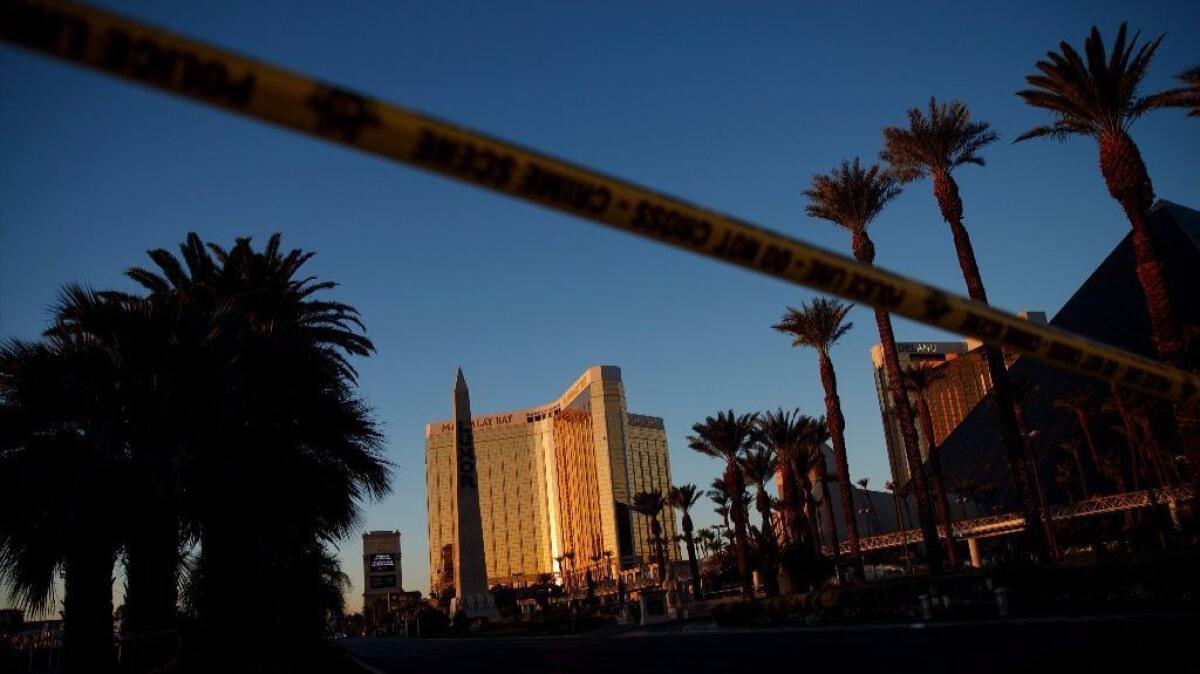Nevada was warming to gun restrictions before this week’s mass killing. What now?

- Share via
Reporting from Las Vegas — As Linda Green stood behind police tape and gazed at the Mandalay Bay hotel, she thought about the months ahead — the sadness, the healing, the push for gun control legislation.
“This event will change everything,” said the 72-year-old retiree and longtime resident of Las Vegas. “Once everything settles I think we will revisit this gun control thing.”
Even before a gunman opened fire from the 32nd story of the hotel onto an outdoor country music festival, killing at least 59 people and leaving more than 500 injured, Nevadans were accustomed to political battles over gun control.
The state allows open carrying of firearms and honors concealed weapon permits from nearly two dozen states.
But in recent years, as proposed gun restrictions have fizzled out in Congress, residents here have been receptive to state legislation imposing certain limitations. This sets Nevada apart from some of its Western neighbors — including Arizona, Utah, Idaho — where 2nd Amendment rights are rarely challenged.
Tick Segerblom, a 69-year-old Democratic state senator and third-generation Nevadan, attributes this to an influx of Latino and college-educated voters that has pushed the electorate to the left. Nevada voted Democratic in the last three presidential elections, and last year voted to legalize marijuana.
“The state has always been kind of bipolar — a mix of California blue and Utah red,” said Segerblom, whose district spans portions of Las Vegas. “When it comes to gun control, the state is moving more to the left, but there are still plenty of concerns from some — mostly conservatives.”
The state entered the crosshairs of the debate over gun control last year with a ballot initiative known as Question 1, which sought to do what federal law has not: require background checks for people buying guns from private sellers.
The initiative passed 50.4% to 49.5%, despite a multimillion-dollar campaign by the National Rifle Assn. to defeat it.
But the law, which was to take effect Jan. 1 of this year, hit a roadblock.
The law called for buyers to be screened through the FBI’s National Instant Criminal Background Check System. But in December, the FBI said it would not conduct the checks and that Nevada could not tell the federal government how to use its resources.
Two weeks after Nevada was informed of the decision, state Atty. Gen. Adam Laxalt issued an opinion that the measure could not take effect without federal cooperation.
“Citizens may not be prosecuted for their inability to comply with the act unless and until the FBI changes its public position and agrees to conduct the background checks consistent with the act,” the Republican wrote.
Last week, supporters of the law said they planned to file a lawsuit on Oct. 9 aimed at forcing Nevada to begin implementing the law.
The push for gun control in Nevada mirrors similar efforts in Colorado, Connecticut and California, which in the wake of failed federal legislation have passed laws placing limits on the size of ammunition magazines and beefed-up background checks.
“As these shootings happen, more and more states will be forced to act,” said Segerblom, who supported Question 1. “This shooting should wake up politicians here who are opposed to stronger laws.”
The gunman in Sunday’s shooting at the Mandalay Bay, 64-year-old Stephen Paddock, apparently bought the guns he used legally, passing the required background checks, according to law enforcement officials.
In interviews in Las Vegas on Tuesday, several people said that expanding background checks wouldn’t hurt, but it wouldn’t help either.
“You can only do so much,” said Ryan Taylor, 21, outside the American Shooters gun range, a 15-minute drive from the Mandalay Bay. “It’s not about gun control. At the end of the day a person is going to do what they’re going to do.”
He added: “It’s the people that don’t follow the rules and events like the recent one that give guns and gun owners a bad name.”
Back on the Strip, where dozens of television reporters were doing live shots, 64-year-old Michael Ooley, who has lived in Las Vegas for 27 years, seemed resigned to the idea that more shootings were inevitable. He pointed to Chicago as an example of a place where strict gun laws have failed to curb violence.
“It’s an example of more regulation and more regulation and nothing gets accomplished,” he said.
Even Green, who voted in favor of Question 1 and believes the timing is right for more legislation, expressed ambiguity about whether laws could stop the killing.
“I know some cultures removed guns and people use knives or machetes,” she said. “If someone is going to kill somebody, they’re going to do it.”
“There’s just no clear answer,” she said.
Twitter: @kurtisalee
ALSO
Las Vegas shooting victims: Portraits of the fallen
The mystery of Stephen Paddock — gambler, real estate investor, mass killer
More to Read
Sign up for Essential California
The most important California stories and recommendations in your inbox every morning.
You may occasionally receive promotional content from the Los Angeles Times.















